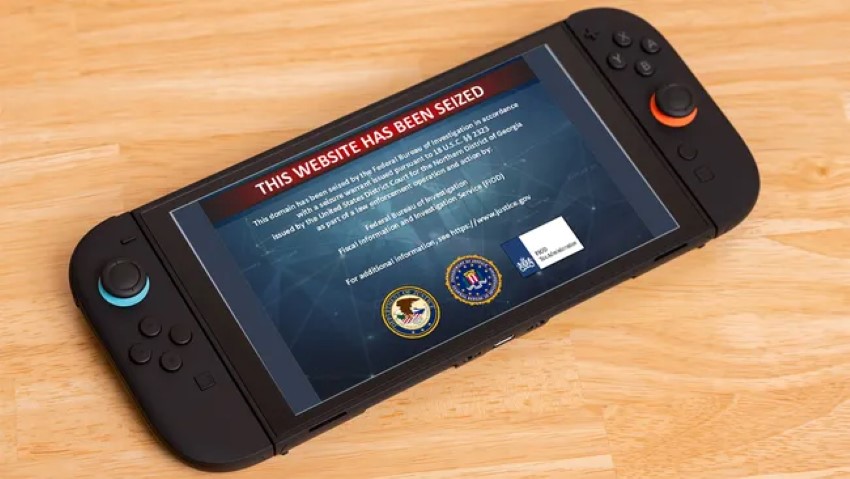- Joined
- Jul 5, 2025
- Messages
- 310
- Level up in
- 190 posts
- Reaction score
- 1,236
- Points
- 1,977
- Location
- Somewhere in the world
Nintendo Switch 2: Illegal gaming platform shut down by US authorities
Written by Sven Brückner
Published: July 16, 2025
Nintendo Switch 2 Piracy
As part of an international law enforcement operation, the popular website NSW2U.com, which provided illegal copies of Nintendo Switch games, was taken down by the U.S. Federal Bureau of Investigation (FBI) and the Dutch Fiscal Information and Investigation Service (FIOD). The domain now bears a seizure notice featuring the logos of the law enforcement agencies involved. The action was based on a search and seizure warrant pursuant to 18 U.S.C. § 2323 issued by the United States District Court for the Northern District of Georgia.
NSW2U.com was considered a central hub for users who wanted to illegally download ROMs of Switch games to run on modified consoles or emulators on PCs and smartphones. The site was a staple in piracy circles for years and offered a wide range of content, from indie titles to current top titles.

The closure is one of a long list of measures Nintendo is taking to prevent unauthorized access to its software. The Japanese company is known for its uncompromising approach to copyright infringement. In the past, it has not only sued ROM portals, but also banned users who used modified software or hardware.
The new Nintendo Switch 2 is a particular focus. In addition to software-based measures such as DRM and system checks, Nintendo has also implemented hardware-based restrictions: Third-party docks are blocked; only the official dock and a single compatible model from a third-party manufacturer currently function reliably. However, even the latter could become unusable due to firmware updates, which has already attracted regulatory attention, for example from the Brazilian competition authority, which is questioning Nintendo's end-user agreements.
Despite technical limitations compared to its PC competitors, especially the Steam Deck or Asus' ROG Ally X, the Switch 2 is posting impressive sales figures. It already surpassed its predecessor's sales figures by more than one million units on its launch weekend. Nintendo's strict protection measures are therefore not only legally motivated, but also economically understandable. The platform's appeal depends largely on exclusive titles, whose distribution through illegal channels could jeopardize its long-term market success.
The future will tell how sustainable these measures are. As with many previous platforms, where one piracy site falls, several more often emerge. Combating illegal content thus remains a constant race between rights holders and their technical and legal resources on the one hand, and resourceful users on the other.
Written by Sven Brückner
Published: July 16, 2025
Nintendo Switch 2 Piracy
As part of an international law enforcement operation, the popular website NSW2U.com, which provided illegal copies of Nintendo Switch games, was taken down by the U.S. Federal Bureau of Investigation (FBI) and the Dutch Fiscal Information and Investigation Service (FIOD). The domain now bears a seizure notice featuring the logos of the law enforcement agencies involved. The action was based on a search and seizure warrant pursuant to 18 U.S.C. § 2323 issued by the United States District Court for the Northern District of Georgia.
NSW2U.com was considered a central hub for users who wanted to illegally download ROMs of Switch games to run on modified consoles or emulators on PCs and smartphones. The site was a staple in piracy circles for years and offered a wide range of content, from indie titles to current top titles.
The closure is one of a long list of measures Nintendo is taking to prevent unauthorized access to its software. The Japanese company is known for its uncompromising approach to copyright infringement. In the past, it has not only sued ROM portals, but also banned users who used modified software or hardware.
The new Nintendo Switch 2 is a particular focus. In addition to software-based measures such as DRM and system checks, Nintendo has also implemented hardware-based restrictions: Third-party docks are blocked; only the official dock and a single compatible model from a third-party manufacturer currently function reliably. However, even the latter could become unusable due to firmware updates, which has already attracted regulatory attention, for example from the Brazilian competition authority, which is questioning Nintendo's end-user agreements.
Despite technical limitations compared to its PC competitors, especially the Steam Deck or Asus' ROG Ally X, the Switch 2 is posting impressive sales figures. It already surpassed its predecessor's sales figures by more than one million units on its launch weekend. Nintendo's strict protection measures are therefore not only legally motivated, but also economically understandable. The platform's appeal depends largely on exclusive titles, whose distribution through illegal channels could jeopardize its long-term market success.
The future will tell how sustainable these measures are. As with many previous platforms, where one piracy site falls, several more often emerge. Combating illegal content thus remains a constant race between rights holders and their technical and legal resources on the one hand, and resourceful users on the other.


